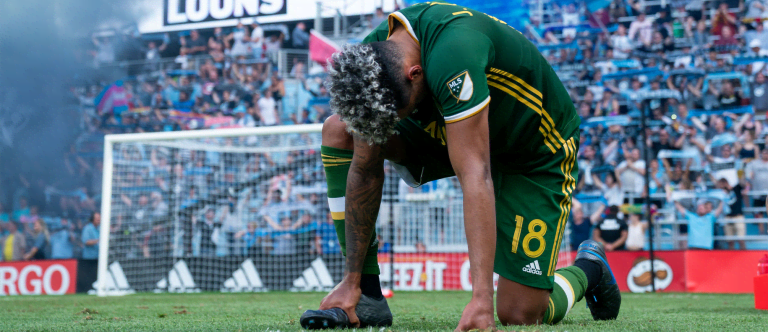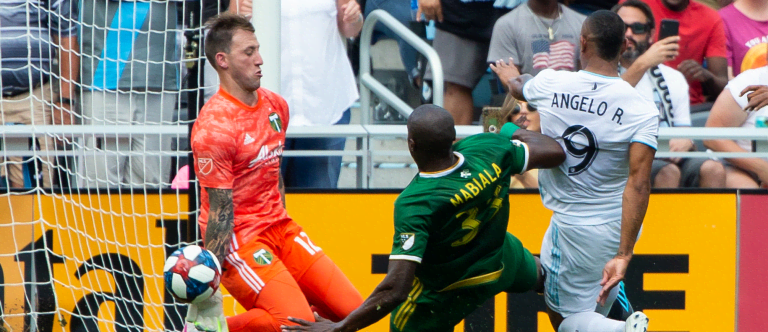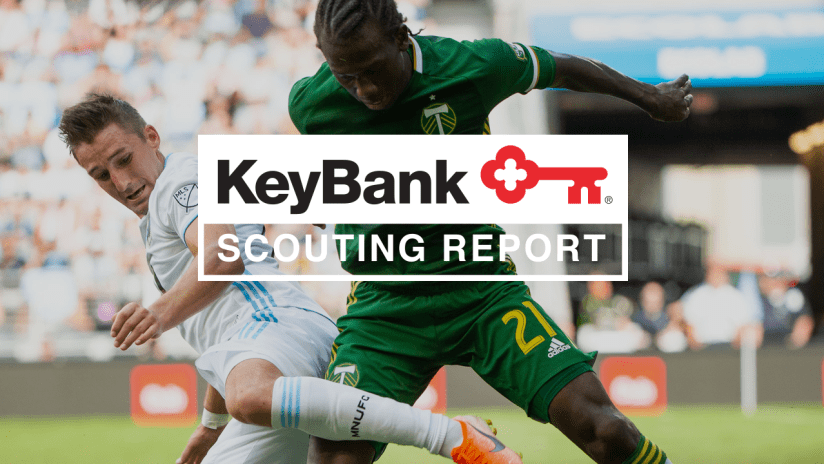Three days shouldn’t be enough to give the matchup a completely different feel, but with the stakes of a U.S. Open Cup semifinal casting Wednesday’s match at Allianz Stadium in a new context, Sunday may tell us little about this, the next match between Minnesota United FC and the Portland Timbers.
At least, let’s hope it doesn’t tell us much. Neither team played poorly nor well. Neither had or gave up a lot of chances. Sunday’s was two hours of fighters posturing to land the first blow, with both evoking a posing, posturing Nuke Laloosh. “I never strike another man first.”
But somebody’s going to have to throw a punch on Wednesday. This isn’t a mid-season league battle, where a draw awaits if you don’t get the fortune of a late-match whistle. One team’s tournament will be over in two, two-and-a-half hours. If you wait to throw the first punch, you could be knocked out.
For the second time in team history, the Timbers are two wins away from U.S. Open Cup, one of two titles (along with Concacaf Champions League) the club’s never won. And whereas the years before head coach Giovanni Savarese’s arrival saw a team almost-always drawn away in Seattle fall out of love with the competition, there is a new energy behind the team’s life in the Cup. After a quarterfinal run last year, Portland’s getting used to counting a second competition among their goals.
Win Wednesday, and that goal will be within reach, with only one more match separating the Timbers from new silverware, a place in Champions League, and the first trophy of the Savarese era. Lose, and disappointment will cloud the team’s preparations for Saturday against Vancouver.
Here is your mid-week KeyBank Scouting Report: Three areas of focus ahead of Portland’s U.S. Open Cup semifinal (5 p.m. PT, ESPN+):
- FROM SUNDAY:
The lineup changes
How much each team has left in the tank after Sunday’s game may prove the most important factor in Wednesday’s semifinal, especially if the game goes 120 minutes.
For Portland, we have some indication they can manage this challenge even if they don’t rotate their lineup. Between games on July 18 (vs. Orlando) and 21 (at Seattle), the Timbers only changed two starters, bringing fullback Jorge Villafaña in for Zarek Valentin and attacker Jeremy Ebobisse in for Andy Polo. Neither of those decisions seemed motivated by fatigue. Villafaña was still recovering from a leg injury for the Orlando game, while Polo’s start came after a long spell away at Copa América. In the game the Timbers should have been tired, they handed the Sounders their first home loss.
Minnesota has had to deal with a similarly short turnaround twice this season, with both occasions coming in the last month. Between the Loons’ 3-1, July 3 win over San Jose and the team’s 3-2, July 6 victory at Stape Saputo, head coach Adrian Heath heavily rotated, vaulting seven new names into that Wednesday night’s starting lineup. When games on July 10 and 13 handed Minnesota the same task, Heath carried over 10 starters from the mid-week match. The biggest difference between the two sets of games: Minnesota had to travel to Montreal but stayed at home for the games the following week.
The lesson here seems to focus on travel. Though the Timbers had to play away in Seattle, the short trip up Interstate 5 allowed the team to stay on schedule. Without losing a day, they were able to recover then train before going on the road. Likewise, when Minnesota faced New Mexico United then FC Dallas, they didn’t lose a game within matchups. Ahead of Wednesday’s game, neither the Loons nor Portland had to take to the road.
Savarese and Heath could still choose to change things up. Darwin Quintero is likely to come in for the Loons, while Ebobisse might be back in the starting lineup for Portland. But if those changes happen, fatigue may only be a small consideration. As these teams’ recent histories show, they can do two games in four days, as long as they don’t have to travel.
- QUICK STRIKES: Portland with most USOC wins since 2013

The game’s stakes
Every U.S. Open Cup semifinal means something. Both of Wednesday’s teams, though, have reason to look at this chance as more special than most. Neither club has felt so close to this competition’s final two.
Minnesota’s short history in Open Cup features a fourth round and Round of 16 exit. Even if you go back to the team’s North American Soccer League days, they’ve never been this far, having bowed out by the fourth round in their six previous tournament appearances. Now, on a run highlighted by wins against Sporting Kansas City and the defending champions, the Houston Dynamo, the Loons are at home with a chance to reach their first major final. You’d understand any fan who expects to make the last two.
For Portland, Wednesday’s game will mark the team’s second semifinal appearance, with the organization having never reached a U.S. Open Cup final. Though the last time the team reached this stage, in 2013, there was the feeling Portland was enjoying a special season, there was an equally strong feeling that their opposition, Real Salt Lake, had their number. The Timbers finished 0-4-2 against RSL that season, losing to Jason Kreis’s team in the final four of both the Open Cup and the MLS Cup playoffs.
This year feels like a better opportunity to advance, and if they do, Portland will get one of two matches they would relish: a potential return to Central Florida to face an Orlando team that dramatically came back against them at the beginning of the last MLS season; or, a trip to Atlanta United FC, where the Timbers would get another crack at a Cup final in Mercedes-Benz Stadium against MLS’s reigning champions.
There mere occasion of either game is something to play for, but it also casts a strong contrast with the alternative: Losing, seeing the opportunity slip away, and leaving Minnesota with nothing from their time in the Twin Cities.

The carryover effect
In terms of how Wednesday night could play out, Sunday seemed to provide a hint, one we only realized as the first half began to unfold.
Though the Timbers nearly scored on a Sebastián Blanco blast from right of goal mid-way through that period, much of the half played out in a type of wait-and-see mode, one that extended deep into the second period. Both Portland’s Brian Fernandez and Minnesota’s Mason Toye threatened to open the scoring before, in stoppage time, Ethan Finlay’s penalty kick did so, but for the most part, both teams seemed content to stay reserved, play out the match, and keep posturing as if the Sunday-Wednesday set was a true two-legged battle.
That logic would seem crazy if we hadn’t seen the same dynamic play out last year. In two games across competitions in Los Angeles, against LAFC, both sides demurred during a 0-0, “first leg” draw. Come Wednesday, in the win-or-else scenario, the teams combined for five goals, seemingly pursuing the small advantages they’d identified three days before.
It seems almost impossible we won’t see a similar dynamic on Wednesday. Minnesota, the side that has the most incentive to stay the course, is getting their best attacking player (Quintero) back, while Portland’s 1-0, Sunday loss gives them reason to try something new. While that something new may not be another five-goal game, neither Savarese nor Heath are afraid to engage a shootout. The Timbers have been involved in nine matches, this season, where the sides have combined for at least four goals; Minnesota’s done that 10 times in 2019.
Both teams have the measure of the other, now. Perhaps that measure will mean one (or both) will stay conservative, fearing the damage the other could do. It’s more likely, though, that each team will try to exploit weaknesses they saw in the other.












